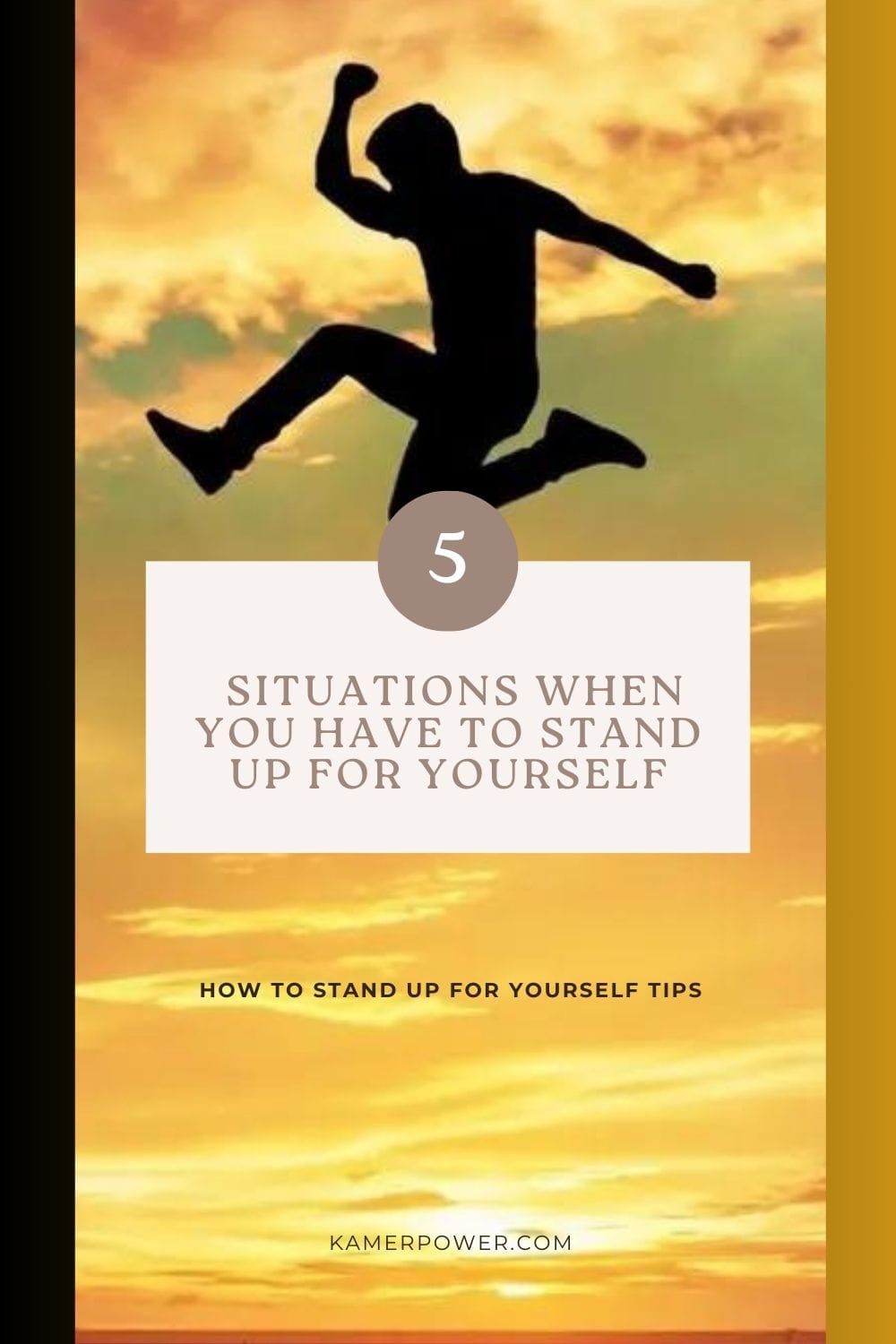How To Stand Up For Yourself: & 5 Situations When You Have to Stand Up for Yourself
How To Stand Up For Yourself: & 5 Situations When You Have to Stand Up for Yourself. A life where you stand up for yourself is a confident life. It means your voice counts. It means what matters to you, matters. And it means that you always get to choose.
When you stand up for yourself, self-confidence is essential. It helps you to confront the issue, make eye contact with those you’re dealing with, and look out for your well-being. In this article, you learn various ways to stand up for yourself in any situation. Some people find it harder to be assertive or speak up for themselves than others. It can feel scary to stand up for yourself if it’s not something you’re comfortable with.
Contents
Why Can It Be a Little Hard To Stand Up For Yourself

1. Low self-esteem.
This quality may go hand-in-hand with people-pleasing. Low self-esteem may make you believe that your needs and desires are fundamentally less important or valid than those of others, leading you to contort to suit the needs and desires of everyone else. In this situation it can be difficult to recognize that your own thoughts and feelings matter.
2. Fear of rejection or anger.
Standing up for yourself can upset other people, which is a price some are unwilling to pay—even to their detriment. It may be linked to low self-esteem or past experiences where they felt or witnessed rejection or anger resulting from themselves or a loved one attempting to stand up for their needs.
3. Cognitive distortions.
These are flawed patterns of thinking that can cause difficult emotions. They’re often associated with mood disorders like depression and anxiety. For example, the cognitive distortion of catastrophizing may make someone predict the worst possible outcome of a situation, even before it plays out. Overgeneralization could make someone who had one negative experience trying to stand up for themselves assume that outcome for all future cases.
4. Negative past experiences.
Any of the factors listed above could stem from a negative experience. Someone who grew up in a volatile and abusive environment may have witnessed frightening outcomes from a parent or caregiver standing up for themselves. Or someone may carry fears and anxieties about being assertive due to a past toxic relationship.
5. People-pleasing tendencies.
Those with these tendencies feel pressured to prioritize the needs of others over their own. They may have trouble saying no and might even alter their personalities to fit what they believe someone else wants.
6. They are interacting with a manipulative person.
Some people may be skilled at convincing others to change their opinions or guilting them into doing so. Interacting with someone like this can make someone less likely or unable to stand up for themselves, as they find it difficult to explain why their feelings matter.
Why you should learn to speak up for yourself?
Learning to stand up for yourself means that you’re looking out for your well-being and bettering your mental health. You’re defending your self-worth when you take up this action. Standing up for yourself also means learning to set boundaries. Rather than be a people pleaser, you must be intentional to change a pattern of being a pushover. Standing up for yourself takes time to learn and become comfortable with.
Ways to Stand Up for Yourself in Any Situation
The various ways to speak up for yourself are as follows:
1. Practice makes perfect.
Once you start getting the hang of what it means to stand up for yourself, it’s time to practice asking for what you want as often as possible. When someone says something you openly disagree with, or you feel pushed into doing something you don’t want to do, say something.
2. Stand up for your time.
Time is a precious and limited commodity, and yet we often feel pressured to give it away when we have the ability to say no. There are times when you might not have a choice, such as when your boss says a project has high priority. But don’t let obligations dictate how you spend the hours of your day. You are in control of your own time.
3. Fake it till you make it.
Learning to stand up for yourself won’t happen overnight. It takes time to grow comfortable with being assertive. While you are in the learning stage, it might help to imagine that you are an actor learning to play a new role.
4. Stay true to your words
After you’ve set boundaries and advocated for your own needs, you may feel the need to apologize. Try your best to ignore this feeling. You can be straightforward and assertive without apology. If you feel like you need to justify your request skip the “I’m sorry, but” part. Clearly state what’s on your mind.
5. Know when to leave
If another person makes the environment toxic, it’s best to leave. You probably aren’t interested in discussing the topic in a shouting match. Exit the room, get some fresh air, and make sure you’re safe from physical harm. Walking out isn’t a form of surrender but rather self-care.
6. Consider how you could be giving too much
Giving your time and energy to people is great, but don’t overdo it. If you do, people will expect you to agree to any request or statement. Reflect on your relationships and think about where there’s an imbalance. Does one of your friends make you feel angry when they ask you for outlandish favors all the time? Do you still say yes?
7. Understand that saying no can be a good thing
There’s nothing wrong with saying no to people. If you’re in an environment that makes you uncomfortable or you don’t want to do a task, saying no can be beneficial. An example of this is if a coworker asks you to take on more work than you’re capable of doing. You can explain that you already have a full schedule and can’t take on anything else.
8. Clarify first, without attacking.
It’s tempting to take a self-righteous stand, especially if you are sure you are in the right. From your viewpoint, you are justifiably defending yourself against someone who seems to be entirely in the wrong. But it’s important to resist the urge to react with emotion. Instead, take a breath and calmly explain your perspective to them. Avoid combative tones or accusatory words.
9. Figure out what’s really bothering you.
Going with the flow for the purposes of not making waves actually creates more stress and anxiety for yourself. Of course, mustering the courage to face something or someone that is bothering you can feel scary. But facing the issue will empower you to make it better and diminishes the control it has over you.
10. Practice being transparent and authentic.
It might be difficult at times, but if you learn to express yourself openly and honestly, it will feel like a weight has been lifted from your shoulders. So often, we hide behind a halfhearted smile and nod instead of saying what we think. It takes practice, but learning to be authentic and open about what you are feeling or thinking is the first step.
11. Recognize that no one can invalidate you.
You are in complete ownership of your feelings and actions. Your beliefs, emotions, thoughts and ideas belong to you, and no one else can tell you what you feel or invalidate your opinions. Likewise, if you seek to invalidate other people’s points of view, you are also sabotaging any chance for problem-solving or having an open discussion.
12. Emulate words with your body’s posture
How you present yourself to others as you speak can also impact your assertiveness — slouching or mumbling don’t help you get your point across. Try to show your confidence with your body language. Stand up straight, speak firmly and calmly, and maintain eye contact while you’re speaking.
13. Take your time with your response
You’re under no obligation to respond to what people say when it comes out of their mouths. If you can, take a moment to digest what kind of situation you’re in and think about how you’re feeling. Think about what insecurities might be impacting you right now. You have the authority to explain how and when you’ll deal with specific situations.
Top Situations When You Have To Stand Up For Yourself
1. When you can lead
Leading is really just about believing in something enough to align your behavior behind it. Find yourself whining and whinging because people in charge don’t have a clue? At work, in government, in your community and even at home, it’s the simplest thing in the world to look at the shots called by others and tear it all apart.
2. When there’s something real at stake
The choice to stand up for yourself is a simple one — either do or you don’t. When things are on the line, some people stand up, and some don’t. This isn’t just about wild fiction or action movie tropes, it’s about real people getting involved because they give a shit. An injustice in your community that fires you up. A change at work that threatens everyone’s great work. A crisis that threatens to engulf a relationship you care deeply about.

3. When someone’s putting you down
If you don’t stand up for yourself when the cost of doing otherwise is to have pieces of yourself chipped away until you’re a shell, then when are you going to? But here’s a little twist. Standing up for yourself doesn’t always mean you need to confront the person putting you down and tell them “No more”. It might need you to stand up and get out of the stories you tell yourself about needing to keep them happy, not wanting to upset them or even believing that you’re not good enough.
4. When you’ll regret it if you don’t
Regrets are things you look back on with the gift of hindsight, and think “If only I’d…”, and that old saying “It’s better to regret the things you’ve done than the things you haven’t”, is largely true. But there are some decisions you make that you need to live with. Some decisions need you to make a choice between stepping up or standing down. And if you suspect that doing nothing or standing down will be a decision you might regret, or if you detect the faint whiff of wanting to play it safe because shit’s getting real, then now might be a great time for a different kind of decision.
Recommendation